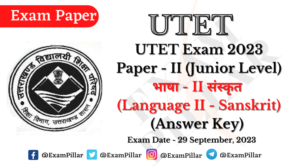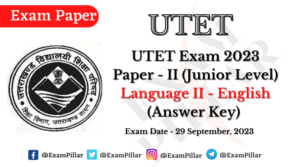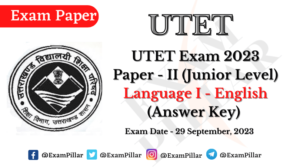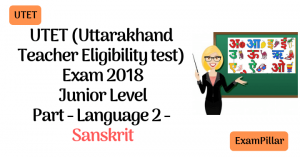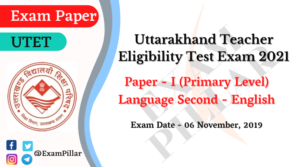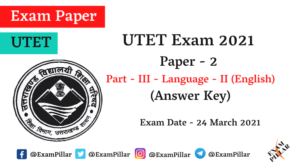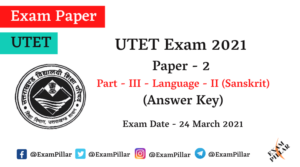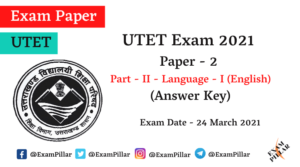UBSE (Uttarakhand Board of School Education) Conduct the UTET (Uttarakhand Teachers Eligibility Test) 2019 Exam on 06 November 2019. Here UTET Paper 2 First Language – English Subject Paper with Answer Key.
Read Also …
- UTET Exam 2019 – Paper – 2 बाल विकास एवं शिक्षण विज्ञान
- UTET Exam 2019 – Paper – 2 भाषा प्रथम – हिंदी
- UTET Exam 2019 – Paper – 2 भाषा द्वितीय – हिंदी
- UTET Exam 2019 – Paper – 2 Second Language – English
- UTET Exam 2019 – Paper – 2 भाषा द्वितीय – संस्कृत
- UTET Exam 2019 – Paper – 2 गणित एवं विज्ञान
- UTET Exam 2019 – Paper – 2 सामाजिक अध्ययन
UTET (Uttarakhand Teachers Eligibility Test) Junior Level
(Class 6 to Class 8)
Exam :− UTET (Uttarakhand Teachers Eligibility Test)
Part :− First Language – English
Organized by :− UBSE
Number of Question :− 30
Exam Date :– 06th November 2019
UTET Exam 2019 Paper – 2 (Junior Level)
First Language – English
Direction (Q. No. 31) : Select the most suitable conjunction and fill in the blanks.
31. No nation can be perfectly well governed ______ it is competent to govern itself
(A) before
(B) since
(C) till
(D) after
Show Answer/Hide
Direction (Q. No. 32) : Fill in the blanks with suitable prepositions.
32. In his work Charak often hints the value of sweet oil.
(A) for
(B) of
(C) at
(D) with
Show Answer/Hide
Direction (Q. No. 33) : Choose the word nearest in meaning to underlined part.
33. Indian economy has always shown enough resilience in crisis :
(A) diversity
(B) strength
(C) elasticity
(D) adjustment
Show Answer/Hide
Direction (Q. No. 34) : In the following sentences choose the word opposite in meaning to the underlined words.
34. I would advise you to pacify your father and not ______ him by arguing.
(A) insult
(B) offend
(C) injure
(D) aggravate
Show Answer/Hide
Direction (Q. No. 35) : Choose the most suitable option that describes the meaning of the following idiom/phrase.
35. He works by fits and starts.
(A) consistently
(B) irregularly
(C) in high spirits
(D) enthusiastically
Show Answer/Hide
Direction (Q. No. 36): Fill in the blank with appropriate auxiliary verb (primary/modal).
36. You ______ light a match; the room is full of gas.
(A) needn’t
(B) won’t
(C) must
(D) Mustn’t
Show Answer/Hide
Direction (Q. No. 37 to 40) : Read the passage given below and answer the questions that follow by selecting the most appropriate option.
When we are suddenly confronted with any terrible danger, the change of nature we undergo is equally great. In some cases fear paralyses us. Like animals, we stand still, powerless to move a step in fright or to lift a hand in defence of our lives, and sometimes we are seized with panic, and again, act more like the inferior animals than rational beings. On the other hand, frequently in cases of sudden extreme peril, which cannot be escaped by flight, and must be instantly faced, even the most timid men at once as if by miracle, become possessed of the necessary courage, sharp quick apprehension and swift decision. This is a miracle very common in nature. Man and the inferior animals alike, when confronted with almost certain death ‘gather resolution from despair’ but there can really be no trace of so debilitating a feeling in the person fighting, or prepared to fight for dear life. At such times the mind is clearer than it has ever been; the nerves are steel, there is nothing felt but a wonderful strength and daring. Looking back at certain perilous moments in my own life, I remember them with a kind of joy, not that there was any joyful excitement then; but because they brought me a new experience – a new nature, as it were – and lifted me for a time above myself.
37. The most appropriate title for the above passage would be :
(A) The will to fight
(B) The miracle of confronting danger
(C) The change of nature
(D) Courage and panic
Show Answer/Hide
38. The author names three different ways in which a man may react to sudden danger. What are they?
(A) He may flee in panic, or fight back or stand still.
(B) He may be paralysed with fear; seized with panic or act like an inferior animal.
(C) He may be paralysed with fear, or seized with panic, or as if by miracle, become possessed of the necessary courage, and face the danger.
(D) He may be paralysed with fear, run away or fight.
Show Answer/Hide
39. The distinction between ‘inferior animals’ and ‘rational beings’ is that :
(A) The former are incapable of fighting.
(B) The latter are clever.
(C) The latter are stronger.
(D) The latter are capable of reasoning things out whereas the former cannot do so.
Show Answer/Hide
40. Explain the phrase ‘gather resolution from danger’:
(A) Find hope and courage
(B) A state of utter hopelessness steels one to fight out the danger
(C) Not to lose hope, but fight
(D) Find courage to face the danger
Show Answer/Hide
Direction (Q.No. 41 to 44): Read the poem given below and answer the questions that follow by selecting the most appropriate option.
Far far from gusty waves these children’s faces. Like rootless weeds, the hair torn around their pallor.
The tall girl with her weighed-down head.
The paper seeming boy, with rats eyes.
The stunted, unlucky heir of twisted bones, reciting a father’s gnarled disease.
His lesson from his desk. At back of dim class
One unnoted, sweet and young. His eyes live in a dream
Of squirrel’s game, in the tree room, other than this.
41. “Squirrel’s game in the tree room” suggests :
(A) Squirrel’s game in the room of a house near the tree
(B). Squirrel’s game in the empty space or hollow part of the tree trunk
(C) Squirrel’s game in a room made on the top of a tree
(D) Squirrel’s game in a house made of tree wood
Show Answer/Hide
42. The paper seeming boy with rat’s eyes means the boy is :
(A) sly and secretive
(B) thin, hungry and weak
(C) unpleasant looking
(D) as thin as a rat
Show Answer/Hide
43. The stunted, unlucky heir of twisted bones means – The boy :
(A) has an inherited ability
(B) was short and bony
(C) has an inherited disability
(D) is insecure
Show Answer/Hide
44. ‘His eyes live in a dream of squirrel’s game, in the tree room other than this’ – means that the boy is :
(A) full of hope in the future
(B) mentally ill
(C) asleep
(D) distracted from the lesson
Show Answer/Hide
45. The receptive skills in any language are:
(A) listening and writing
(B) reading and writing
(C) listening and reading
(D) listening and speaking
Show Answer/Hide


